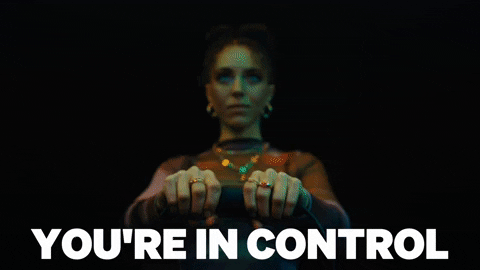I’d bought new headphones for my Zoom calls, got home, ripped open the box and then found out that the headphones won’t plug into my computer. The headset has a USB-C dongle. My computer has no USB-C port. And it doesn’t have Bluetooth either. I was stuck with this headset that wouldn’t work with my computer because I’d already opened the box. So I asked a friend who fixes computers if there was anything I could do about it.
“Why don’t you just get an adaptor?” he said.
It was so obvious! I rolled my eyes at how ignorant I’d been. Of course there was an adaptor! There’s an adaptor for practically everything. I felt really silly for not thinking of it myself.
It's like how we sometimes get tangled in our own thoughts, feeling trapped in situations that seem insurmountable. We often forget that there are tools and strategies—adaptors, if you will—that can help bridge the gap between where we are and where we want to be.
And that gap can seem massive
It can keep us stuck on one side of the problem, peering down into a seemingly bottomless chasm of fear, despair, and frustration. But here’s the twist: that chasm isn’t as impassable as it seems. And with the right tools, we can step right over to the other side.
When you’re dealing with an abusive ex, it often feels like you’re staring into that chasm daily. The mind games, the court battles, the emotional turmoil—it's enough to make anyone feel like they're constantly on the brink of a meltdown. But those adaptors, those mental tools and strategies, are your lifelines.
In my work, I've noticed that each person tends to have their own unique fear pattern in responding to the pressures an abusive ex places on us. We each have our own specific vulnerabilities and we need to develop strategies to adapt and overcome them.
For instance, some people often find themselves imagining worst-case scenarios. This can be a natural reaction to the unpredictability they face, but it's important to have strategies in place to ground themselves and focus on what they can control. They spiral downwards as they careen from one incredibly unlikely “what if?” to the next.
Others struggle with self-doubt, second-guessing their every move and questioning if they’re to blame for the mess. This kind of thinking can make you hold back when it’s time to stand up for what’s yours, like making sure your parenting time stays intact. But spotting this pattern is your first step towards reclaiming your confidence and becoming your own best advocate.
Then there are those who get totally overwhelmed and powerless. If you’re one of these people, your anxiety might have you drowning in the fear of financial collapse or thinking that you’ll never break free from your ex’s control. Those fears are real and valid, but they’re not unbeatable. Crafting a solid plan and rallying support can help you reclaim your sense of agency and stability.
Each of these reactions is a natural way our bodies and minds respond to perceived threats or stressors. And each of us has our go-to response when stress hits, but by identifying these patterns, we can equip ourselves with the right adaptors—the tools and strategies tailored to our needs—to help us cross that chasm and find our power and strength on the other side.

You don’t have to jump. There’s an adaptor for that.
First, I want to say that if you’re experiencing any of this, a therapist who understands trauma and abuse is your first go-to. Coaching can help you adapt but you need therapy to heal your trauma.
With that in mind, here are some “adaptors” for when you’re stuck in one of these situations.
😱 If you’re catastrophizing
When you're envisioning the worst-case scenarios, it's easy to feel paralyzed by fear. But the adaptor for this is perspective. Challenge those thoughts by asking, "What are the actual facts? What can I control?" This helps ground you in reality and prevents the spiral into doom.
😵 If you’re falling for the gaslighting and blaming yourself
If you're being manipulated into questioning your own reality, your adaptor is validation. Seek out trusted friends, keep records, and remind yourself of the truth. Having tangible evidence and supportive allies can help you stay anchored when your ex tries to distort your perception.
😯 If you’re feeling stuck and powerless
It's common to feel like you'll never break free from your ex's influence, but empowerment is your adaptor here. Focus on the small steps you can take to reclaim your power—setting boundaries, taking care of yourself, and celebrating even the smallest victories.
🧐 Self-insight is your most powerful tool
Watch how you respond whenever a stressful situation with your ex comes up and puts you into a state of fear. Note what your mind chatter is saying to you. That will tell you what your standard response is. Once you know this (mine is feeling stuck and powerless), you can plug in the right adaptor to bridge that gap and transform your response.
Once the adaptor is in place, everything clicks, and you're back in control. By understanding your default reactions, you empower yourself to swap out those old, unhelpful patterns for new, adaptive strategies. With the right tools, you’ll find yourself redefining the chaos on your own terms, turning what once felt like insurmountable challenges into stepping stones toward your newfound strength and clarity.

Want to know how I can help you?
Are you ready to bridge the gap and step confidently into your power? It's time to transform your journey from chaos to clarity. Click here to book your complimentary 30-minute discovery session with me. In this free session, we'll explore how I can help you identify your patterns and how we can work together to identify personalized solutions to tackle your challenges head-on. Don't let the chasm keep you stuck—take the leap towards empowerment today.
If you want to find out more about what I do…
Did someone forward this to you?
Resources
"Good Anxiety" by Dr. Wendy Suzuki is like having a pack full of adaptors to deal with your anxiety responses. It flips the script on how we view anxiety, turning it from a menacing shadow into a trusty sidekick. This book digs into the brain’s role in anxiety, revealing how this ancient alarm system, designed to keep our ancestors safe, can go haywire in today’s modern jungle. Suzuki also shows us that this nervous energy can actually be harnessed to sharpen our focus and boost our performance, transforming anxiety from a roadblock into a springboard.
With practical exercises like grounding techniques and controlled breathing, "Good Anxiety" gives you the tools to bridge the gap between feeling frazzled and feeling fabulous. It's a game-changer for anyone ready to stop running from anxiety and start using it as fuel for growth and resilience. If you're looking to turn your stress into strength, this is the guide you didn't know you needed.



